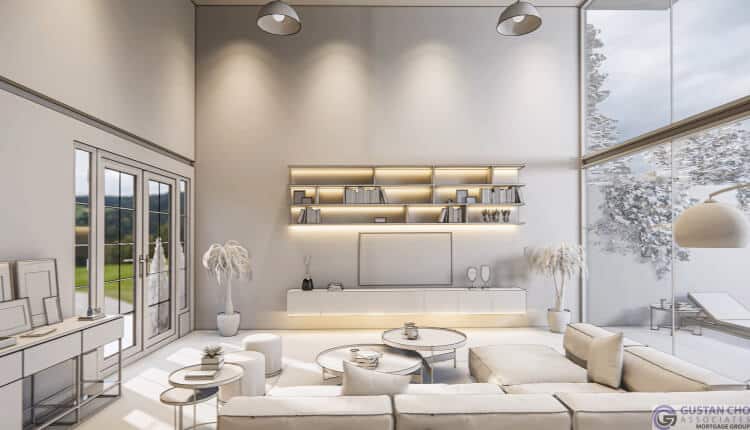How To Get a Mortgage Buying Your First Home
This guide covers how to get a mortgage by buying your first home. Buying your first home can be exciting and demanding, especially if you are a first-time buyer. Those first-time homebuyers should take their time and do the proper due diligence when choosing their new home. The most critical factor in home shopping is whether they can afford it. I would first consult with a lender to see what the buyer will qualify for and the monthly housing payment. Remember that as a homeowner, they can no longer rely on a landlord for repairs. See if a home buyer can afford new proposed mortgage payments and housing expenses without straining themselves. The new homeowner will have the following expenses:
- Property taxes
- Homeowners Insurance
- Mortgage insurance premium
- Homeowners association dues (if applicable)
- Utility payments such as water, gas, and electric
- Other expenses such as cable and internet connection.
Reserves Buying Your First Home Purchase
When Buying Your First Home Purchase, one of the most important things new homeowners need to consider and have is reserves. Reserves will be required in the event of major repairs. Mortgage lenders do not require cash reserves for first-time home buyers with good credit and income. But I strongly recommend that first-time home buyers have at least 3-month reserves of housing expenses in the event of unexpected events.
Buying Your First Home? Learn How Much You Need in Reserves
Apply And Get Pre-Approved Today!
Case Scenario of Needing Reserves
For example, we recently had a major deep freeze in the Midwest, where temperatures tanked 30 plus below zero. Many homeowners had their furnace breakdown and plumbing problems. These types of problems are high ticket cost repairs. Most of these repair vendors do not make monthly payments or offer a payment plan. Appliances break down all the time. As a homeowner, they will get unexpected problems that might cost a lot of money. I strongly advise that as the first-time home buyer, they have several months of reserves. This holds true even though the mortgage lender does not require it.
Hiring a Real Estate Agent When Buying Your First Home Purchase
Hiring a professional real estate agent when Buying Your First Home Purchase is strongly recommended. Whether Buying Your First home purchase or selling an existing home, the advice of a realtor is not required. It is worth its weight in gold. A realtor will assist clients in searching for the right home. Real Estate Agents know the neighborhood and refer clients to reputable lenders and attorneys. A realtor will assist their clients and protect their best interests. A realtor can get buyers a seller’s concession towards closing costs so buyers do not have to come up with any closing costs. All buyers need to worry about is the down payment on a home purchase.
Qualifying For Mortgage When Buying Your First Home Purchase
Hiring the right loan officer and lender is one of the most important decisions a home buyer will make in buying your first home. Not all lenders can be the right fit for the buyer. Anyone with an 800 credit score or a low debt-to-income ratio can get approved by any lender. However, for borrowers who have prior bad credit, credit scores of 580, and outstanding collections, then the chances are that they may need the help of a lender with no overlays and who specializes in helping borrowers with bad credit.
Gustan Cho Associates is a national lender that offers the following: Gustan Cho Associates Mortgage Group is a national five-star lender licensed in most of the 50 states with no overlays. Gustan Cho Associates closes most loans in 21 days or less. Over 80% of our borrowers are folks who get a last-minute loan denial or are currently going through stress in their mortgage process and transferring their loan to us.
The result is that we close their home loans in record time. No overlays on FHA Loans, USDA, and VA Loans with a minimum of 580 credit score requirement. No overlays on Conventional loans. NON-QM Loans where no waiting period after bankruptcy and foreclosure. Available seven days a week. Please contact us at Gustan Cho Associates at 262-878-1965 or text Gustan for faster response at 800-900-8569 or text us for faster response. Or email us at gcho@gustancho.com. Or visit us at www.gustancho.com or email us at gcho@gustancho.com. We are available evenings, weekends, and holidays seven days a week.
How to Choose Where to Buy a Home?
Buying a home is one of the most important decisions you will ever make. Not only will it affect your finances but also your lifestyle, your family, and your future. That’s why choosing where to buy a home is not something you should take lightly. You want to find a place that suits your needs, preferences, and budget and will appreciate value over time. But how do you choose where to buy a home? There are many factors to consider, and each one may have a different weight depending on your situation. Here are some of the most important factors that can help you narrow your location search and find the perfect home.
Budget Buying Your First Home
The primary and most important aspect to take into account is your budget. Assess the amount you are capable of allocating towards a home purchase. This will determine the range of locations and types of homes you can look at. You want to avoid buying a home that will stretch your finances too thin or put you at risk of foreclosure.
To determine your budget, you must consider your income, expenses, savings, debt, and credit score. You must also factor in the costs of buying and owning a home, such as down payment, closing costs, mortgage payments, property taxes, insurance, maintenance, and utilities. It is generally advisable to allocate 50% of your gross monthly income towards housing expenses and limit total debt payments to 50%.
To determine your borrowing capacity and obtain pre-approved loan approval, you can utilize online calculators or seek guidance from a mortgage lender. Once you have a budget, you can look for homes that fit within it. You can use online tools or work with a real estate agent to look for homes by price range, location, size, features, and other criteria.
Location Buying Your First Home
The next factor to consider is the location of the home. Where do you want to live? This will depend on your lifestyle, preferences, and goals. Some of the aspects of location that you may want to think about are:
Proximity Buying Your First Home
How close do you want to be to your work, school, family, friends, shopping, entertainment, health care, and other amenities? Do you prefer a short commute or more space? Do you want to walk, bike, drive, or use public transportation?
Neighborhood Buying Your First Home
What kind of neighborhood do you want to live in? Do you prefer urban, suburban, or rural settings? Do you want a quiet or lively area? Do you care about the crime rate, safety, noise level, cleanliness, and neighborhood appearance?
School District Buying Your First Home
If you have children or plan to have them in the future, the quality of the school district may be a major factor in choosing where to buy a home. You may want to research the test scores, graduation rates, student-teacher ratios, curriculum, extracurricular activities, and reputation of the schools in the area. You may also want to visit the schools and talk to the
teachers and parents.
Homeowners Association
Some neighborhoods have a homeowner's association (HOA) that sets rules and regulations for the residents and maintains the common areas and amenities. An HOA can help keep the neighborhood attractive and safe, but it also comes with fees and
restrictions that may affect your budget and lifestyle. You may want to check the HOA
documents before buying a home in such an area.
First-Time Homebuyer? See How Much You Need in Reserves to Qualify for a Mortgage
Apply Online And Get recommendations From Loan Experts
Climate
The area’s climate is another factor to consider when choosing where to buy a home. Do you prefer warm or cold weather? Do you like seasons or constant sunshine? How do you feel about snow, rain, humidity, or wind? The areas climate will affect your comfort, health, and lifestyle. It will also affect the costs and maintenance of your home.
If you live in a cold area, you may need to pay more for heating and insulation. If you live in a humid area, you may need to deal with mold and pests. Research the area’s average temperatures, precipitation, and natural disasters before buying a home.
You may also want to visit the area at different times of the year to get a feel for the weather. You may find that you love or hate the climate more than expected. The climate is a personal preference that can make a big difference in your happiness and satisfaction with your home. Choose an area that matches your ideal climate or that you can adapt to easily.
Future Buying Your First Home Purchase
The last factor to consider is the future of the home. How long do you plan to stay in the home? How will it fit your changing needs and goals? How will it appreciate over time? Buying a home is a long-term investment that requires planning. You don’t want to buy a home that will become too small or too big for your family in a few years. You also don’t want to buy a home that will lose value or become difficult to sell. Some of the aspects of the future that you may want to think about are:
Resale value Buying Your First Home Purchase
How much will your home be worth when you sell it? This will depend on the supply and demand of homes in the area, the condition and features of your home, and the market trends and economic conditions. You may want to look for homes with a high resale value potential based on location, quality, size, style, and upgrades.
Marketability Buying Your First Home Purchase
How easy will it be to sell your home when you decide to move? This will depend on the appeal and availability of your home to potential buyers. You may want to look for homes that have high marketability based on their price, condition, features, and
uniqueness.
Flexibility Buying Your First Home Purchase
How adaptable is your home to your changing needs and preferences? This will depend on the layout and design of your home and the possibility of making changes or additions. You may want to look for highly flexible homes based on their space, functionality,
and potential.
Does Buying Your First Home a Good Investment?
Choosing where to buy a home is a complex and personal decision that requires careful research and evaluation. You need to consider your budget, location, and future and weigh the pros and cons of each option. You must also be realistic, flexible, and open-minded, as you may need help finding a home meeting your criteria. The most important thing is finding a home you love, suit your needs, and can afford. A home is more than just a place to live; it’s a place to grow, create memories, and enjoy life.
Frequently Asked Questions (FAQs): How to Get a Mortgage? Buying Your First Home
1. What is the first step to buying your first home?
The first step is getting pre-approved by a lender. This determines how much you can borrow and shows sellers you’re a serious buyer.
2. What credit score do I need to buy a house?
Almost all lenders require a 620+ credit score for conventional loans, but FHA loans allow as low as 500 credit scores with higher down payment.
3. How much down payment is needed in buying your first home?
It depends on the loan type:
Conventional: 3%-20%
FHA: 3.5% (with a 580+ score)
VA & USDA: 0% (for eligible borrowers)
4. What is the debt-to-income (DTI) ratio, and why does it matter?
DTI is the percentage of your income used for monthly debt payments. Lenders prefer a DTI below 43%, but some programs allow higher ratios.
5. Can I buy a house with student loan debt?
Yes! Lenders will factor in your monthly student loan payments when calculating your DTI, but different loan programs have flexible guidelines.
6. What documents do I need to apply for a mortgage?
Common documents include:
Pay stubs (last 30 days)
Tax returns (last 2 years)
Bank statements (last 2-3 months)
Employment verification
Credit report
7. How long does the mortgage process take?
Usually, it takes 30-45 days from application to closing, but fast-tracked loans can close in 2-3 weeks.
8. Should I get a fixed-rate or adjustable-rate mortgage?
Fixed-rate: Stable payments over the life of the loan (best for long-term buyers).
Adjustable rate (ARM): Lower initial rate that may increase (best for short-term buyers).
9. Can I be eligible for a mortgage with no credit history?
Some lenders allow alternative credit, like rent, utilities, or phone payments, to establish creditworthiness.
10. Can I back out of a mortgage after being pre-approved?
Yes, pre-approval is not a commitment, but backing out after signing a purchase contract may have consequences.








